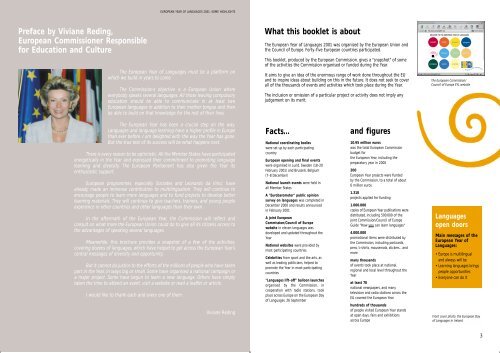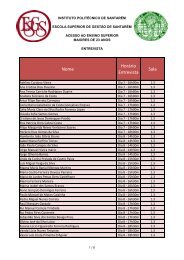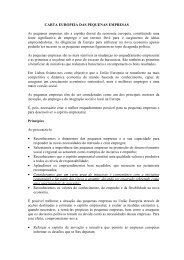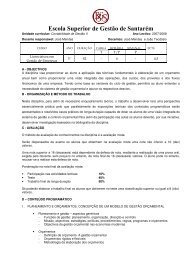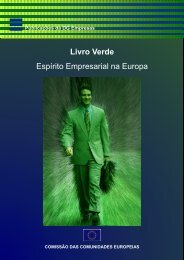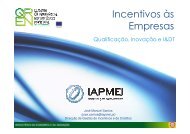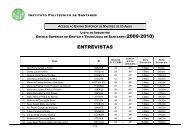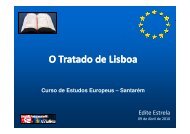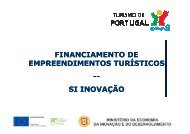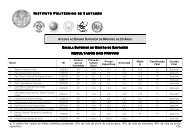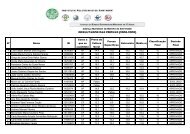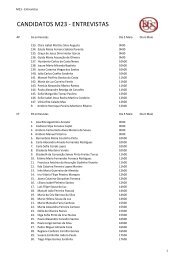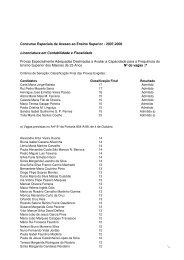Preface by Viviane Reding, European Commissioner Responsible ...
Preface by Viviane Reding, European Commissioner Responsible ...
Preface by Viviane Reding, European Commissioner Responsible ...
- No tags were found...
Create successful ePaper yourself
Turn your PDF publications into a flip-book with our unique Google optimized e-Paper software.
EUROPEAN YEAR OF LANGUAGES 2001: SOME HIGHLIGHTS<strong>Preface</strong> <strong>by</strong> <strong>Viviane</strong> <strong>Reding</strong>,<strong>European</strong> <strong>Commissioner</strong> <strong>Responsible</strong>for Education and CultureThe <strong>European</strong> Year of Languages must be a platform onwhich we build in years to come.The Commission’s objective is a <strong>European</strong> Union whereeverybody speaks several languages. All those leaving compulsoryeducation should be able to communicate in at least two<strong>European</strong> languages in addition to their mother tongue and thenbe able to build on that knowledge for the rest of their lives.What this booklet is aboutThe <strong>European</strong> Year of Languages 2001 was organised <strong>by</strong> the <strong>European</strong> Union andthe Council of Europe. Forty-five <strong>European</strong> countries participated.This booklet, produced <strong>by</strong> the <strong>European</strong> Commission, gives a "snapshot" of someof the activities the Commission organised or funded during the Year.It aims to give an idea of the enormous range of work done throughout the EUand to inspire ideas about building on this in the future. It does not seek to coverall of the thousands of events and activities which took place during the Year.The inclusion or omission of a particular project or activity does not imply anyjudgement on its merit.WELCOME TO THE EUROPEAN YEAR OF LANGUAGESespañoldanskdeutschελληνικαfrançais italiano nederlandsportugués suomi svenskaThe <strong>European</strong> Commission/Council of Europe EYL websiteThe <strong>European</strong> Year has been a crucial step on the way.Languages and language learning have a higher profile in Europethan ever before. I am delighted with the way the Year has gone.But the true test of its success will be what happens next.There is every reason to be optimistic. All the Member States have participatedenergetically in the Year and expressed their commitment to promoting languagelearning and diversity. The <strong>European</strong> Parliament has also given the Year itsenthusiastic support.<strong>European</strong> programmes, especially Socrates and Leonardo da Vinci, havealready made an immense contribution to multilingualism. They will continue toencourage people to learn more languages and to fund projects to develop betterlearning materials. They will continue to give teachers, trainers, and young peopleexperience in other countries and other languages than their own.In the aftermath of the <strong>European</strong> Year, the Commission will reflect andconsult on what more the <strong>European</strong> Union could do to give all its citizens access tothe advantages of speaking several languages.Meanwhile, this brochure provides a snapshot of a few of the activities,covering dozens of languages, which have helped to get across the <strong>European</strong> Year’scentral messages of diversity and opportunity.But it cannot do justice to the efforts of the millions of people who have takenpart in the Year, in ways big or small. Some have organised a national campaign ora major project. Some have begun to learn a new language. Others have simplytaken the time to attend an event, visit a website or read a leaflet or article.I would like to thank each and every one of them.<strong>Viviane</strong> <strong>Reding</strong>Facts...National coordinating bodieswere set up <strong>by</strong> each participatingcountry<strong>European</strong> opening and final eventswere organised in Lund, Sweden (18-20February 2001) and Brussels, Belgium(7-8 December)National launch events were held inall Member StatesA "Eurobarometer" public opinionsurvey on languages was completed inDecember 2000 and results announcedin February 2001A joint <strong>European</strong>Commission/Council of Europewebsite in eleven languages wasdeveloped and updated throughout theYearNational websites were provided <strong>by</strong>most participating countries.Celebrities from sport and the arts, aswell as leading politicians, helped topromote the Year in most participatingcountries"Languages lift-off" balloon launchesorganised <strong>by</strong> the Commission, incooperation with radio stations, tookplace across Europe on the <strong>European</strong> Dayof Languages, 26 Septemberand figures10.95 million euroswas the total <strong>European</strong> Commissionbudget forthe <strong>European</strong> Year, including thepreparatory year in 2000200<strong>European</strong> Year projects were funded<strong>by</strong> the Commission, to a total of about6 million euros1.310projects applied for funding1.000.000copies of <strong>European</strong> Year publications weredistributed, including 500.000 of thejoint Commission/Council of EuropeGuide "How you can learn languages"4.000.000promotional items were distributed <strong>by</strong>the Commission, including postcards,pens, t-shirts, mousemats, stickers... andmoremany thousandsof events took place at national,regional and local level throughout theYearat least 70national newspapers, and manytelevision and radio stations across theEU covered the <strong>European</strong> Yearhundreds of thousandsof people visited <strong>European</strong> Year standsat open days, fairs and exhibitionsacross EuropeLanguagesopen doorsMain messages of the<strong>European</strong> Year ofLanguages:• Europe is multilingualand always will be• Learning languages bringspeople opportunities• Everyone can do itFront cover photo: the <strong>European</strong> Dayof Languages in Ireland3
EUROPEAN YEAR OF LANGUAGES 2001: SOME HIGHLIGHTSCelebrating languagesEurope’s linguistic diversity is one of its greatstrengths, intrinsically linked with its culturalvariety.The <strong>European</strong> Commission attaches greatimportance to the role of learning languages inpromoting cultural understanding, both among<strong>European</strong>s and between <strong>European</strong>s and others.Mary McAleese, President ofIreland, meets children at theLanguages Lift Off in Dublin on26 September47% of peoplein the EU can speakno language other thantheir mother tongue.Having language skills makes people more ableto embrace different cultures rather than feelthreatened <strong>by</strong> them. Equally, access to theculture associated with a language is apowerful motivation for learning it.Words426% of people in the EUcan speak at leasttwo languages other thantheir mother tongue.Most of the projects the Commission fundedduring the Year had cultural aspects. Somewere centred on bringing people from differentcountries together or on multilingual culturalfestivals. Others were simply enjoyableactivities which helped to promote the Year’smessages.For example, the project coordinated <strong>by</strong> theFrench Ministries of Culture, Foreign Affairs,Education and Youth/Sport "Dix mots pour leslangues du monde" (Ten words for thelanguages of the world) was simple, yet inspiring.A panel of linguists, writers and artists chose tenwords in French, and created a short text orpoem around each word. The list was translatedinto ten languages: Spanish, German, English,Italian, Portuguese, Occitan, Hungarian, Arabic,Haitian Creole and Lingala (spoken mostly inZaire and the Congo).The words were circulated throughout Franceand beyond via a booklet and Internet site, withan invitation to use them as a starting point forcreative work, in any language. The invitationwas taken up <strong>by</strong> hundreds of schools, businesses,cultural organisations and individuals. Therewere over three hundred lectures, workshops,exhibitions and competitions based on thewords.With its project "In Other Words", the Artslaborganisation in Ireland wanted to strengthenlinks with other areas of Europe wherebilingualism and minority languages are animportant part of culture and identity.Simultaneous celebrations of the <strong>European</strong> Dayof Languages on 26 September were organisedin the Republic of Ireland (Cabinteely, DúnChaoin), Northern Ireland (Derry, Enniskillen),Catalonia (Toroella de Montgris) and the BasqueCountry (Bera de Bidasoa). Further celebrationswere organised for Christmas.Young people from each place created a multilingualInternet site to exchange informationabout traditional festivals. Meanwhile, youngartists created original works representing theproject, including a board game and a cloak withpockets filled with objects linked with theparticipating cities, towns and villages.Enjoying languagesOne of the many high profile events which tookplace in Portugal during the Year was the"Festa das Línguas" (Festival of Languages)organised <strong>by</strong> the Fundação Centro Cultural deBelém. The two-day open air festival at the endof September included circus, theatre, dance,music and other activities in about 20languages, as well as the "Languages Lift Off"balloon launch organised <strong>by</strong> the Commission. AsMaria do Carmo Correia de Oliveira, of thePortuguese national coordinating body for theYear, said to one of many Portuguesenewspapers which covered the event: "theprinciple is that languages have an intrinsicvalue, as a heritage to conserve, but also assomething simply to be enjoyed".Languages on filmWatching films with subtitles – rather than dubbedversions – is an excellent way of improving one’sknowledge of foreign languages while havingfun at the same time.Cinema was an important part of the <strong>European</strong>Year in several countries. The InstitutoCervantes and the Filmoteca in Madridorganised a three-week festival concentratingon films in regional and minority languages. InLiechtenstein in July, the Vaduz film festivalfeatured films in four languages. The Queen’sFilm Theatre in Belfast, Northern Ireland, alsohosted a multilingual festival. Films also featuredin the innovative selection of activities organisedThe language most spokenas a mother tongue in theEU is German (23% of thepopulation).English, French and Italianare each spoken <strong>by</strong> about16% of the EU population.5
EUROPEAN YEAR OF LANGUAGES 2001: SOME HIGHLIGHTSCelebrating languagesLanguage learningis for everyoneThe <strong>European</strong> Year hot air balloon provided <strong>by</strong> Euroscript, Luxembourg<strong>by</strong> the rural region of Figueira de CasteloRodrigo, Portugal. These also included an internationalcookery competition and a windowdressing contest for local shops.Hip HopThere was an important place for youth culturein the Year. In one of the more unusual projects,in Amsterdam, a group of <strong>European</strong> culturalinstitutes coordinated <strong>by</strong> the Goethe InstitutInter Nationes organised a "Euro Hip Hop"night in October. There were rap groups fromeight countries and an accompanying bookletwith examples of their lyrics. "Not the kind ofpoetry you find in books", the reader was warned,but expressive and powerful nonetheless. Inseveral other <strong>European</strong> cities, including Madrid,Bordeaux and Brussels (see below), networksof national cultural institutes also got together,with support from the Commission, to organise<strong>European</strong> Year activities.Hot airMeanwhile, the <strong>European</strong> Year of Languageshot air balloon succeeded in attracting plentyof attention with its flights in Brussels, Munichand Luxembourg. Giveaways, quizzes, games andother activities around the balloon were mostlyaimed at children. The lucky ones also had thechance to make short flights. This <strong>European</strong>project was coordinated <strong>by</strong> Euroscript inLuxembourg.Some people have had bad experiences oflanguage learning during their education orbelieve that they are just "not good at it" or thatit is not useful for them. But language learning isfor everyone, whatever their age or nationality.Knowledge of languages opens the door to newexperiences and often to better job prospects. Italso makes it much easier to take advantage ofthe right to live and work elsewhere in the EU.GuideModern methods encourage the learner to usethe language to communicate, from thebeginning. If they invest some effort, people ofall ages can make quick progress, either throughorganised classes or <strong>by</strong> learning at home.These are key messages of the guide "How youcan learn languages", which gives some simpleadvice on how to learn effectively. The guide waspublished <strong>by</strong> the <strong>European</strong> Commission and theCouncil of Europe in May 2001, to coincide withthe <strong>European</strong> Adult Language Learners’ Week (5-11 May). Nearly half a million copies have beendistributed.Taste a languageMany projects co-financed <strong>by</strong> the Commissionincluded "language tasters" in their programme.These short sample lessons are an effective wayof getting people interested in language learning.In Brussels, the "Lingua Snacks" project offeredtasters in a wide range of languages, along withan edible snack to help entice people to takepart! The 30 minute classes were based on the"total physical response" method, associatingnew vocabulary with physical actions. CoordinatorRalph Bisschops said: " the method waschosen because learning a language throughactions comes very close to the infant’s languagelearning process and triggers our innate capacityto process verbal input."Venues included a library, a major cinemacomplex, and the <strong>European</strong> Commission’s pressroom, where a demonstration lesson in Czechwas given for journalists. On the <strong>European</strong> Day ofLanguages on 26 September, the snacks wereserved as part of an exhibition of projects in theCinquantenaire Park in Brussels, centred aroundthe "Languages Lift Off" balloon launch performed<strong>by</strong> <strong>European</strong> <strong>Commissioner</strong> <strong>Viviane</strong><strong>Reding</strong>.Another project participating in that event was"Vivre les langues" (Living with languages),managed <strong>by</strong> the Brussels network of <strong>European</strong>cultural institutes. Seven institutes from variousEU Member States provided tasters in the parkand at their own premises. Afterwards, tocelebrate the success of the network’s efforts andof the <strong>European</strong> Day, hundreds of young peoplefrom all over Europe danced the night away atthe Universal Language Techno Party.72% of people in the EUbelieve knowing foreignlanguages is useful.87% of the 15-24 agegroup believe foreignlanguage skills are useful.Among other projects offering language tasterswas the "Tower of Babel" in Iceland, which helda language fair in May, in association withcultural institutes, adult education groups andimmigrant organisations. The project alsoproduced a comprehensive guide to languagelearning oportunities in Iceland.6Finnish children wait to startthe Languages March inHelsinki on 26 SeptemberThe language learner’s guide published <strong>by</strong>the Commission and Council of Europe in MayThe Italian city of Arezzo organised a series oftaster activities in summer 2001. The cityrounded off the Year with an arts and food7
EUROPEAN YEAR OF LANGUAGES 2001: SOME HIGHLIGHTSLanguage learningis for everyoneThe language train throughthe Tyrol attracted plenty ofcommuters every day51% of the EU populationwould be preparedto learn languages for anhour or more a week.festival in a specially created "<strong>European</strong> village",with guests and performances from many EUand non-EU countries.In Austria, meanwhile, the "Marktplatz derSprachen" (Languages marketplace) project sentteachers from adult education centres to offertasters and advice in shopping centres and otherpublic places in Vienna, St. Pölten, Graz, andEisenstadt.Bringing languages to the publicMillions of people in Europe travel to work onpublic transport ever day. Why not use that timeto learn a language ? That was the idea behindthe Sprachenzug (Language train) project alsobased in Austria, this time in Innsbruck.Over a six week period, in a special carriage ofa daily commuter train through the Tyrol,passengers had the chance to take free conversationlessons and computer based courses infive languages. As the organisers, the TyrolBerufsörderunginstitut (vocational training institute)put it: "It is great to be able to bring theactivity to the target group rather than the otherway round".The "language chat cafés" in Norway, alsobrought languages to potential learners in aplace where they were likely to be receptive tonew ideas. The Tønsberg Folkeuniversitetet(University for all) worked with café owners inseven towns in south-east Norway to offercustomers food, wine, music and literaturefrom various countries.Organiser Judy Fossgard said : "Our emphasis wasthat language is so much more than words."Partly as a result of the chat cafés the Folkeuniversitetethas experienced a 40% rise inenrolments to learn languages.A little goes a long waySome language learners become discouragedbecause they do not become fluent immediately.But one does not need a perfect command of alanguage to use it successfully. It is possible tounderstand the gist of something, especially inwriting, <strong>by</strong> knowing or guessing the meaning ofjust some of the words. The "E-pedia" Internetcompetition launched on 26 September inThessalonaki, Greece, aimed to raise interest inlanguage learning and show that a littleknowledge could go a long way. Entrants had torecognise different languages from short extractsof newspapers, reports or web-sites and translateshort texts into Greek.Business opportunitiesBetter language skills can increase businessefficiency, reduce costs and improve competitiveness.Many projects reflected this.On 26 September in Copenhagen, a partnershipof 14 organisations attracted 3000 participantsto a national exhibition and conference called"Europa - sprogenes arbejdsplads" (Europe –the workplace of languages). The event broughttranslation agencies, publishing houses andlanguage technology companies together withpotential clients.employees and to adapt their business practice todifferent cultures. As one speaker put it:"Language skills are not only a professional toolbut part of the corporate identity. They shouldalso be a source of corporate pride".Speaking the languages of trading partners is asimportant in agriculture as in any other business.More contacts between rural areas can helpmake Europe more environmentally friendly andimprove the quality of production. These werekey themes of the "Helpdesk" project managed<strong>by</strong> the Confederazione Italiana Agricoltoridell'Umbria (Federation of Umbrian farmers)with rural partners from Ireland, France andSpain.As part of the main Italian celebration of the<strong>European</strong> Day of Languages in Perugia, theFederation organised a conference and distributedregional farm products. The project also setup a Internet forum for language teachingexperts, agricultural businesses, farmers andfarmworkers.Special needsThe "Freunde sprechen viele Sprachen"(Friends speak lots of languages") project inHamburg illustrated how children and youngpeople with disabilities or special needs can enjoylanguage learning. The project organised 50different events across the city from 17-21September, involving mainstream and specialschools, further education colleges, teachers’trade unions and local politicians, including themayor of Hamburg.Among the activities were a video competition, amusic and dance festival attended <strong>by</strong> 2.500disabled children, and a photo-exhibition aboutthe many different nationalities of children livingin Hamburg.The challengeIn several countries, the "Languages Challenge"showed that learning languages is fun and thateven busy people can do it.Part of the languages marketplace in St Pölten, Austriato reach achievable learning targets. Some raisedmoney for charity at the same time throughsponsorship from friends and businesses.Over fifty well-known UK public figures includingactors, television personalities, sports stars andMembers of the UK, Scottish and Welsh Parliamentsalso took part. Former England footballcaptain Gary Lineker urged people to take up thechallenge, saying : "I've really enjoyed learningSpanish and Japanese. Getting to grips with anew language can be great fun, and you learn somuch about other people and what makes themtick."The challenge theme was enthusiastically takenup <strong>by</strong> the media. Many of the national andregional radio stations which cooperated withthe Commission over the <strong>European</strong> Day ofLanguages ran their own versions of thechallenge.22% do not learnlanguages becausethey believe they are"not good" at them.The Help Desk project inItaly produced this posterThe aim was to encourage companies to developa language strategy for their business and theirIn the UK, where the idea originated, thousandsof members of the public challenged themselves89
EUROPEAN YEAR OF LANGUAGES 2001: SOME HIGHLIGHTSAll languages are important17% of retired peoplecan speak at least onelanguage other thantheir mother tongue.78% of universitystudents can speakanother language.The Commission wanted to get across themessage that all languages used in Europe area crucial part of the continent’s heritage and ofits future, however many native speakers alanguage has and whether or not it is widelyused <strong>by</strong> non-native speakers.All the Commission’s information material,including all publications and the EYL websiteprovided jointly with the Council of Europe,was produced in all the eleven officiallanguages of the <strong>European</strong> Union.The content was made available to MemberStates so that they could produce at theirdiscretion further language versions. On thewebsite, the interactive sections such as thediscussion forum and poetry game were able toaccept contributions in any language selected<strong>by</strong> the user.Regional and minority languagesA large proportion of the activities selected forfinancing covered regional and minority languages.For example, the project "Languesrégionales de France : parler d'Europe"(Regional languages of France: speaking ofEurope) organised a series of informationweeks on eight regional languages: Alsatian,Breton, Basque, Catalan, Corse, Créole, Langued’Oil and Langue d’Oc. Open days were held inschools in the relevant regions and visitors hadthe chance to try using the languages.The Welsh Language Board’s <strong>European</strong> Yearproject focused on encouraging children andadults to learn both Welsh and other languages.All secondary schools in Wales receiveda leaflet in Welsh and English explaining theadvantages of learning a range of languages.All public libraries, further education collegesand other adult education institutions receivedanother leaflet aimed at adult learners and abooklet called "All you ever wanted to knowabout learning Welsh but were afraid to ask".The KELTIC (Knowing <strong>European</strong> LanguagesTo Increase Communication) project coveredmany languages, including minority languagesfrom the Atlantic Arc, such as Galician, Basque,Breton and Gaelic. The coordinators, theViceconsejería de Educación de Asturias, Spain,described their aim as "changing mentalitiesand breaking down barriers". A major event inOviedo in May included an exhibition, conferencesand workshops for teachers and thegeneral public. From 24-26 September, aninternational conference on language learningfor young children brought together teachersfrom all over Europe and beyond. The projectalso included several competitions, includingone on designing a working environment forlearning languages at home.Pupils from Mapledene Primary School, Birmingham, whose "whole school" languages challenge included teachers, other staff and pupils.Urdu and Panjabi, as well as <strong>European</strong> languages,were involved.More languages in educationSeveral <strong>European</strong> Year projects aimed to stimulatedebate among administrators, teachers,parents and students about widening languageprovision in full-time education.The Dutch project "Het talencircus" (the languagecircus) aimed to interest teachers and 14and 15 year olds in Spanish, Italian, Russian,Turkish and Arabic. After a morning’s preparation,pupils carried out a number of tasks(buying food, visiting the post office etc) in"language villages" set up in their school. Informationon adding new languages to the schoolcurriculum was published on the project’swebsite.more employable and have better opportunitiesto use their right to free movementwithin the EU. As Wolfgang Mackiewicz, thePresident of the <strong>European</strong> Language Council,put it: "By investing in languages, universitiesand public authorities are investing in thefuture of their students - and of Europe".43% of people in the EUspeak no English.The Freie Universität Berlin and the <strong>European</strong>Language Council organised a major <strong>European</strong>conference on multilingualism and languagelearning in universities.10The KELTIC eventin Asturias inMay got off to amusical startThe long term objective is to encourageuniversities to offer a wide range of languagesto all students, not only language specialists. Ifacademic staff, students and graduates aremultilingual and culturally adaptable, they are11
EUROPEAN YEAR OF LANGUAGES 2001: SOME HIGHLIGHTSAll languages are importantThe <strong>European</strong> Year of Languagesand the mediaSign languagesA poster promoting the Finnish Deaf Association’s project.The "Handbaletten" sign language choir, which performed at the MalmöFestival as part of the "Sign language for all" project.Sign languages are not only for deaf people.Many of the projects co-financed <strong>by</strong> theCommission also focused on introducing signlanguages to hearing people, thus making themmore aware of deaf people’s needs."Conoce nuestra lengua" (get to know ourlanguage) was organised <strong>by</strong> the ConfederaciónNacional de Sordos de España (SpanishFederation of Deaf People) to raise publicawareness of Spanish sign languages. The CNSEorganised exhibitions and conferences all overSpain, as well as seminars for teachers of signlanguages.In Germany, the "Euro Sign Kongress" inMunich on 7-8 September brought togethermajor Deaf Associations in Europe. Among thethemes discussed were international trends insign language policy and the use of signlanguages in telecommunications, including onthe Internet.The "Sign language for all" project offeredentertaining activities in and around Malmö,Sweden. These included a sign language poetrycompetition, a rock concert ("Sign rock"), a filmfestival, stand-up comedy, and language tasterevents in schools. Politicians and other hearingadults took part in a quiz testing sign languageskills.The project was coordinated <strong>by</strong> the HadarFoundation, which also set up an online course insign language. ElseMarie Brisenhorn of theFoundation said: "Our aim is to attract attentionto sign language and show its communicativepotential. What we want most of all is to increasethe integration of deaf people in society".The Finnish Deaf Association’s campaign,"Viittomakieli - yksi äidinkielistämme" (Signlanguage, one of our mother tongues) providedfree sign language courses in Helsinki during theSign Language Week from 5-11 November. Aspecial package was distributed to schools to tellhearing students about sign languages. The<strong>European</strong> Year featured in the Association’s"video magazine", sent monthly to householdswith deaf members.At selected points during the Year, theCommission issued sets of press releases,including a general <strong>European</strong> release and anational one for each country.These led to extensive coverage which reachedmany millions of people all over Europe. TheEurobarometer results in particular stimulateddebate across the continent.Media coverage of the <strong>European</strong> Day ofLanguages was also very wide and wasreinforced <strong>by</strong> the Commission’s cooperationwith the major radio stations whichparticipated in the Europe-wide "LanguagesLift Off" balloon launch. Finders of the balloonscould phone radio stations and win prizesincluding holiday vouchers.Copies of the Commission’s <strong>European</strong> Yearcartoon animation were supplied to a largenumber of television companies and broadcastfree of copyright on Europe <strong>by</strong> Satellite, theEU’s television news service.Many of the projects co-financed <strong>by</strong> theCommission also succeeded in obtainingcoverage in national, regional and local media.The Commission provided the national mediawith brief details of all the projects in theircountries and supplied each project with aguide: "How to get your project noticed".A number of projects co-financed <strong>by</strong> theCommission were directly managed <strong>by</strong> mediaorganisations, and achieved excellent results. Afew are described below.CelebritiesThe Greek national TV channel EPT created 100two-minute spots entitled "Do you speakforeign languages?" Greek celebrities fromthe arts, sport and entertainment industriestalked about their personal experience oflearning languages. Total viewing figures wereestimated at around 8 million. The firstbroadcast was on the <strong>European</strong> Day ofLanguages (26 September).In Denmark, the DR1 channel broadcast in theautumn a series of ten programmes, eachfocusing on a well-known Dane and their experiencesof a different language or country. Eachprogramme was broadcast three times.Subjects included Jan Heintze, a footballer withPSV Eindhoven in The Netherlands, GitteHaenning, a singer living in Germany and sculptorPeter Brandes, whose home is in France.98% of Luxembourgerscan speak at leastone language other thantheir mother tongue.Over 85% of Danish, Dutchand Swedish people canspeak another language.1213
EUROPEAN YEAR OF LANGUAGES 2001: SOME HIGHLIGHTS1471% of EU residents believeeveryone should speak atleast one foreign language.74% of parents thinkspeaking foreign languageswill improve their children’scareer prospects.30% of EU residents prefersubtitles to dubbing.But in countries wheresubtitles are often used,over 60% prefer them.ChattingThe French international TV station TV5, whichreaches 130 million homes all over the world,produced 90 video-clips for its collection "Leplaisir des mots, l'amour des langues"(Pleasure of words, love of languages). The filmsshowed young people speaking various<strong>European</strong> languages in situations ranging fromoffices and shops to just chatting with friends.The producers described their aim as "simply toshow the enjoyment that comes from speakingseveral languages".One of the videos was shown each day fromSeptember to the end of the year on TV5. Theywere also shown on partner international TVstations and on TV5’s website. The site featureda series of lesson plans suggesting howteachers could use the clips in class and acompetition based on the "dix mots pour leslangues du monde" project managed <strong>by</strong> FrenchMinistries (see above).Youth shows the wayThe <strong>European</strong> Year of Languagesand the mediaBudding journalists from the Euroreporter projectmeet <strong>European</strong> <strong>Commissioner</strong> <strong>Viviane</strong> <strong>Reding</strong>.The Finnish foreign language teachers’ federation(Suomen kieltenopettajien liitto-SUKOL) produced a humourous televisionadvertisement aimed at showing young peoplehow useful it is to know foreign languages. Theadvert showed a teenage Finn on holidayordering a meal in fluent Spanish, to thesurprise of his adult companion. National televisionstation MTV3 broadcast the sequence 22times over a two-week period in the approachto the <strong>European</strong> Day of Languages, and estimatedit was seen <strong>by</strong> 16 million people. A videoof the advertisement will in future be used inschools. SUKOL also produced an informationbooklet for primary schools, which was distributedto every seven year old in the country.The <strong>European</strong> Year also invested in the influentialreporters of the future. The "Euroreporter"project in Belgium organised a competition foryoung people to produce a report from interviewswith native speakers of other languages.Winners’ contributions were published andwinners invited to visit major news organisations.Some of the project’s young participantsinterviewed <strong>European</strong> <strong>Commissioner</strong> <strong>Viviane</strong><strong>Reding</strong> on the <strong>European</strong> Day of Languages.A <strong>European</strong> Year of Languages postcard.<strong>European</strong> Year of Languages projects - participating organisationsAlpha Signes Asbl, BRUXELLES • CICEB, BRUXELLES • Ecole d'Interprètes Internationaux (EII), MONS • Centre d'Animations en Langues, LALOUVIÈRE • Ville de Mons, MONS • Vrij Universiteit Brussel, BRUSSEL • Cervo Go (Centrum voor Regionaal Volwassenenonderwijs van hetGemeenschapsonderwijs), DE PANNE • Talencentrum Universiteit Gent, GENT • Association des Etats Généraux des Etudiants de l'Europe,BRUSSELS • <strong>European</strong> Trade Union Committee for Education, BRUSSELS • Ministerium der Deutschsprachigen Gemeinschaft, EUPEN •Undervisningsministeriet Uddannelsesstyrelsen, KØBENHAVN K • Aarhus Universitet, AARHUS C • Sproglærerforeningen, GANDRUP •Danmarks Radio, SØBORG • Danske Døves Landsforbund, KØBENHAVN • Brønd<strong>by</strong> Kommune, BRØNDY • Erhvervssprogligt Forbund,KOBENHAVN • Vestfyns Gymnasium, GLAMSBJERG • Århus Købmandsskole, VIBY J • Freie Universität Berlin, BERLIN • Universität Bielefeld,BIELEFELD • Kreisfreie Stadt – Stadt Augsburg, AUGSBURG • EXILE - Kulturkoordination e.V., ESSEN • Senatsverwaltung für Schule, BERLIN •Staatl. Seminar für Schulpädagogik (Gymn.), TÜBINGEN • Kinder-und Jugendfreizeitzentrum Wuhleide-Landesmusikakademie-gemeinnützigeBetriebsgesellschaft mit beshränkter Haftung, BERLIN • Kulturring in Berlin e.V., BERLIN • Thalia Theater Halle, HALLE ( SAALE) • NordfriiskInstituut, REDSTEDT • Schulverein der Förderschule Pröbenweg, HAMBURG • Deutscher Gehörlosen-Bund e.V., KIEL • Stadt Paderborn,PADERBORN • Kunst ist gut e.V., BERLIN • Unternehmen Kultur Bildungsprojekt Kunst und Kommunikation e.V., DRESDEN • Bildungs- undSchulungs-Institut Schweinfurt-Suhl (BSI), SCHWEINFURT • Universität Bayreuth, BAYREUTH • DeGater'87, POTSDAM • Jugendpresse Sachsene.V., DRESDEN • Euro-Schulen Organisation, STOCKSTADT • RWTH Aachen, AACHEN • Deutsches Institut für Erwachsenenbildung, FRANKFURT• Ruhr-Universität Bochum, BOCHUM • Landeshauptstadt Stuttgart - Kulturamt - Stadtbücherei, STUTTGART • Comité des Professeurs dufrançais du Nord de la Grèce des Diplômés d'Université - APLF, THESSALONIKI • EPT A.E., ATHENS • Keese-Dimotiki Epixirisi Argyroupolis-Exidikevmeno Kentro Epaggelmatikis Katartisis Kai Apokatastasis Anergon Kofon Neon, ATHENS • ECOSE, ATHENS • MIXAIL LEVIS A.E.(LINGUAPHONE), ATHENS • EXODUS A.E., ATHENS • Despec Multimedia Systems, ATHENS • Politistikos Organismos Dimou Agioy NikolaouKritis, AGIOS NIKOLAOS • Aristotelio Panepistimio Thessalonikis, THESSALONIKI • Didaskaleio Xenon Glosson, ATHENS • Ellhnogermaniki Agogi,ATHENS • Emporiko ke Viomilhaniko, LARISA • Confederación Nacional de Sordos de España (CNSE), MADRID • Associació Xarxa FP,BARCELONA • Viceconsejería de Educación, OVIEDO • Universidad de Salamanca, SALAMANCA • Instituto Cervantes, MADRID • D.GOrdenación Académica, MADRID • Universidad de Barcelona., BARCELONA • Consejeria de Educación. Junta De Galicia., SANTIAGO DECOMPOSTELA • C. E. C. E., MADRID • Fundacion Radio Ecca, MADRID • IES "José Manzano", DON BENITO • Colegio Sagrado Corazón, PALMADE MALLORCA • Universidad De Santiago De Compostela. Instituto De Idiomas, SANTIAGO DE COMPOSTELA • Associación "EJE", JAÉN •Mancomunidad De Municipios De La Sierra De Cádiz, VILLAMARTIN (CADIZ) • Mancomunidad De Municipios De La Costa Del Sol occidental,MARBELLA • Asociación Europea De Profesores De Español, MADRID • Ales, SAN SEBASTIÀN • Consejeria De Educación y Universidades,MURCIA • Diputación De Badajoz, BADAJOZ • GENERALITAT VALENCIANA., VALENCIA • D. G. de Ordenación e Innovación Educativa., SANTACRUZ DE TENERIFE • Diputación Provincial de Málaga, MÁLAGA • Instituto de Enseñanza Secundaria Guadiana, AYAMONTE • Asociación deEducación de Personas Adultas, BARCELONA • Ministère de la culture et de la communication, PARIS • Maison de l'Europe de Toulouse / Midi-Pyrénées, TOULOUSE • Ministère de l'Education nationale, PARIS • Circom Regional, STRASBOURG • Bibliothèque municipale Rueil-Malmaison,RUEIL-MALMAISON • Service universitaire de la formation continue Carrefour rural européen, SAINT-ETIENNE • Caisse Centrale de la MutualitéSociale Agricole, BAGNOLET CEDEX • Satellimages TV5, PARIS CEDEX 07 • AFNOR, PARIS LA DÉFENSE • The British Council Bordeaux,BORDEAUX CEDEX • Centre européen Robert Schuman, SCY-CHAZELLES • Collectif antiraciste de Corse "AVA BASTIA", AJACCIO CEDEX • TheAnglo-French Theatre Project, PARIS • Comité français du Bureau européen des langues moins répandues, QUIMPER • Association de Gestiondu réseau des Centres d'Etudes des Langues des CCI, LE HAVRE • Académie européenne du Nord de l'Europe, LILLE CEDEX • Confédérationnationale des radios libres, SAINT-DENIS • Université du Maine, LE MANS CEDEX 9 • Chambre de Commerce et d'Industrie de la Drôme,VALENCE CÉDEX • Institiúid Teangeolaíochta Éireann (ITÉ), DUBLIN • Kildare Education Centre, KILDARE TOWN • St Louis High SchoolRathmines, DUBLIN 6 • An Biuro Eorpach do Theangacha Neamhfhorleathana, DUBLIN 2 • Artslab, Fenit, BRAY, CO WICKLOW • EVENTIProductions, BOLZANO • I.R.R.S.A.E. Lombardia, MILANO • Ente Nazionale Sordomuti, ROMA • Confederazione Italian Agricoltori dell'Umbria,PERUGIA • ANCEI - Formazione e Ricerca, ROMA • Associazione Culturale Multirifrazione Progetti, ROMA • PROFIT, MILANO • AmministrazioneProvinciale di Chieti, CHIETI • Comune di Arezzo, AREZZO • Ass. Italo Tedesco per l'Europa, TRENTO • Comune di Cremona, CREMONA •Direzione Didattica Anzio 1° Circolo, ANZIO • Provincia di Avellino, AVELLINO • Comune di Santa Maria di Licodia, SANTA MARIA DI LICODIA- CT • Comune di Pesaro, PESARO • Provincia Autonoma di Trento, TRENTO • CIPREF, PERUGIA • Comune di Corciano, CORCIANO • Universitàdegli Studi di Catania, CATANIA • Università degli Studi di Pavia, PAVIA • Euroscript S.a.r.l., BERTRANGE • Organisation Mondiale des Poètes,LUXEMBOURG • Convention théâtrale européenne, LUXEMBOURG • Talenacademie Nederland, MAASTRICHT • Studio TaalwetenschapHelsloot Verrips, AMSTERDAM • Fryske Akademy, LEEUWAARDEN • Vereniging van Leraren in Levende Talen, AMSTERDAM • CPS te Amersfoort,AMERSFOORT • Algemeen-Nederlands Verbond, DEN HAAG • NaB-MVT, ENSCHEDE • Stichting Euroschool, ALKMAAR • Koning Willem ICollege, 'S-HERTOGENBOSCH • Goethe-Institut Amsterdam, AMSTERDAM • Talenacademie Nederland, MAASTRICHT • Gilde Nederland,UTRECHT • MSC <strong>European</strong> Bureau for Lesser Used Languages, LEEUWARDEN • Keijzer en Botter communicatie adviseurs BV, DEN HAAG •Universität Wien Geisteswissenschaftliche Fakultät, WIEN • ARBOS, KLAGENFURT • Berufsförderungsinstitut bfi Tirol, INNSBRUCK • UniversitätInnsbruck, INNSBRUCK • Bundesministerium für Bildung,, WIEN • Programm-Kino Wels - Lichtspiele im Greif, WELS • Gabinete de AssuntosEuropeus e Relações Internacionais, LISBOA • Câmara Municipal de Miranda do Douro, MIRANDA DO DOURO • Câmara Municipal de Aveiro,AVEIRO • Fundação Centro Cultural de Belém, LISBOA • Associação do Comércio e Serviços do Distrito da Guarda, GUARDA • SOFATI-Sociedade de Formação e Aplicações Técnicas de Informática, Lda, ODIVELAS • Faculdade de Letras da Universidade do Porto, PORTO •Cooperativa do Ensino Politécnico, CRL, VILA NOVA DE GAIA • Câmara Municipal de Figueira de Castelo Rodrigo, FIGUEIRA DE CASTELORODRIGO • Kansalais - ja työväenopistojen liitto KTOL, HELSINKI • Jyväskylän yliopisto - TÄKK, JYVÄSKYLÄ • Suomen kieltenopettajie, liittoSUKOL ry, HELSINKI • Pohjois-Karjalan ammatillen, JOENSUU • Kuopion kaupunki, KUOPIO • Solvalla-Finns, HELSINKI • Kuurojen Liitto ry,HELSINKI • Turun kaupungin koulutoimintakeskus, TURKU • Tampereen ammattiopisto, TAMPERE • Suomen kieltenopettajien liitto SUKOL ry,HELSINKI • Folkuniversitetet förbundskansliet, STOCKHOLM • Stockholms universitet, STOCKHOLM • Folkuniversitetet Kursverksamheten vidLunds Universitet, LUND • Ester Mosessons Gymnasium, GÖTEBORG • Grekiska Riksförbundet, SUNDBYBERG • Organising Bureau of <strong>European</strong>School Student Unions, STOCKHOLM • Stiftlesen Hadar, MALMÖ • Sverigefinska Folkhögskola, HAPARANDA • Utv. enheten för inv.-oflyktingfrågor i Botkyrka, TUMBA • Centre for information on Language Teaching and Research - CILT, LONDON • Technology Colleges Trust,LONDON • Bwrdd Yr Iaith Gymraeg / Welsh Language Board, CARDIFF • Southampton City Council, SOUTHAMPTON • Kent County Council,MAIDSTONE • The Victoria University of Manchester, MANCHESTER • Brasshouse Language Centre, BIRMINGHAM • Centre for Info onlnformation on Language Teaching & Research, LONDON • The University of Liverpool, LIVERPOOL • Bell College of Technology, HAMILTON •Archbishop Michael Ramsey Technology College, LONDON • University of the West of England, Bristol, BRISTOL • Sefton Council Education,BOOTLE • Centre for Language Study, LEEDS • Cyfarthfa High School, MERTHYR TYDFIL • Glenrothes College, GLENROTHES, FIFE • WarwickshireLEA, WARWICK • The <strong>European</strong> Theatre Company Ltd., LONDON • Wokingham District Council, WOKINGHAM • The British Council, CentralBureau, BELFAST • Queens Film Theatre, BELFAST • Nottingham City Council, NOTTINGHAM • Endurmenntunarstofnun, REYKJAVIK• University of Iceland, REYKJAVIK • Hugvísindastofnun Haskóla Íslands, REYKJAVIK • Verein Film Fest, Vaduz, VADUZ • Telemarksforsking -Notodden, NOTODDEN • VOX Voksenopplæringsinstituttet, OSLO • Folkeuniversitetet Tønsberg, TØNSBERG • Kunnskapsnettet, TOENSBERG •15
© EC 2001Directorate General for Education and CultureEN<strong>European</strong> Year of Languages 2001:some highlightsContactsThe <strong>European</strong> CommissionDirectorate-General for Education and CultureLanguage Policy UnitRue de la Loi/Wetstraat 200B-7,B-1049 Bruxelles/BrusselTel: + 32 2 299 4335Fax: + 32 2 299 6321E-mail: info-2001@cec.eu.intInternet: http://europa.eu.int/comm/education/languages/index.htmlContact details for all of the projects mentioned in this booklet anddescriptions of all the projects co-financed <strong>by</strong> the Commission can befound via the above Internet address.Some key results of the Commission’s Eurobarometer survey onlanguages are given in this brochure. Full results are at:http://europa.eu.int/comm/education/languages.htmlCouncil of EuropeLanguage Policy DivisionDirectorate of Education and Higher EducationF-67075 Strasbourg CedexTel.: + 33 3 88 41 35 33 / 32 48Fax: + 33 3 88 41 27 06 / 27 88E-mail: decs-lang@coe.intInternet: http://culture.coe.int/lang<strong>European</strong> Commission


